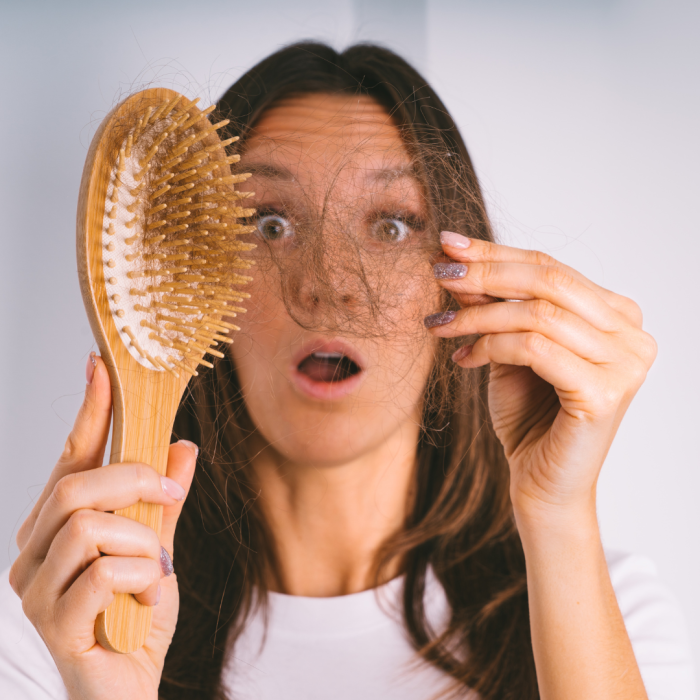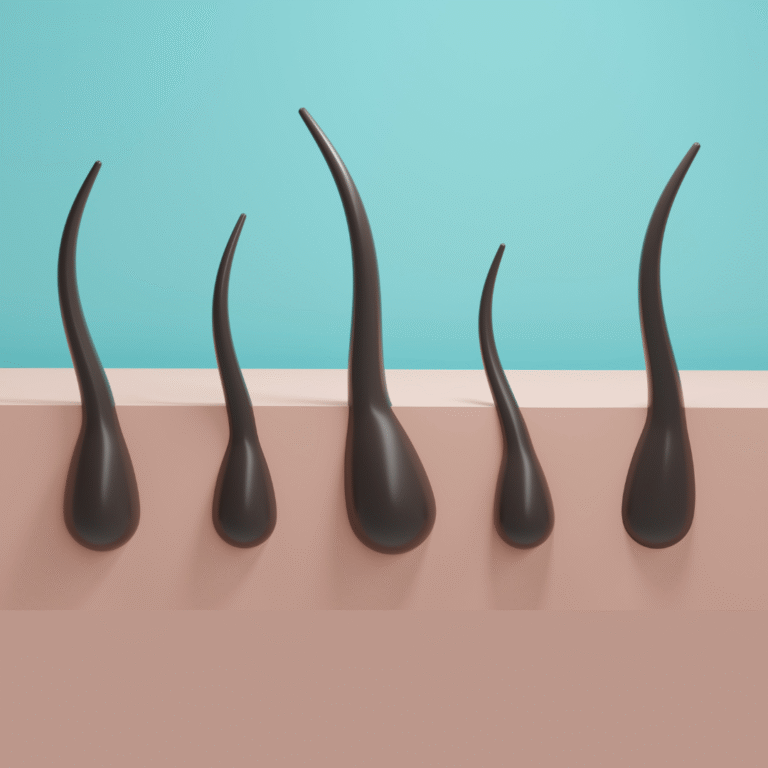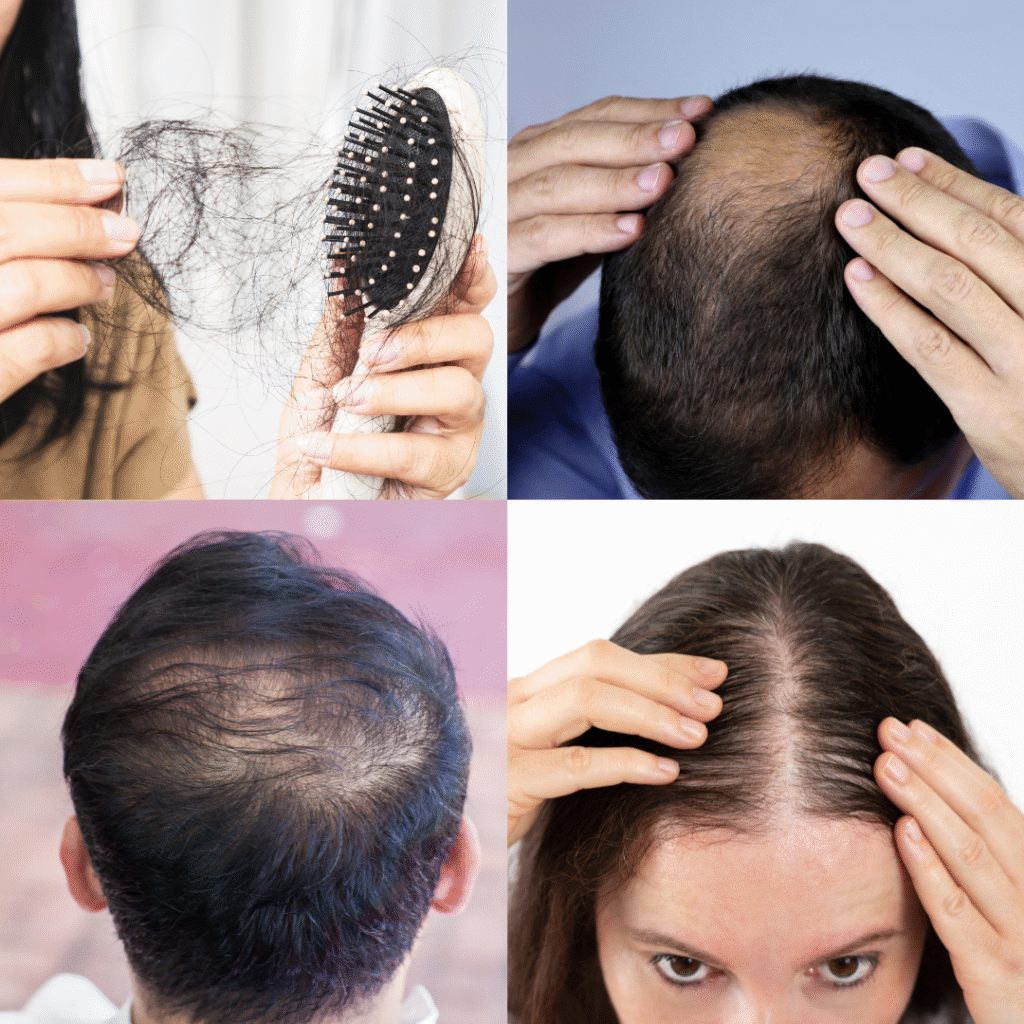Stop Hair Fall Naturally: Understanding Hair Types, Hair Cycle & Proven Ways to Prevent Hair Loss

Hair fall is one of the most frequent hair issues, affecting both men and women. While it is typical to lose 50-100 strands of hair per day, excessive shedding may suggest an underlying problem. Hair loss occurs for a variety of reasons, but understanding hair type, the normal hair growth cycle, and what causes hair loss is the first step toward prevention. In this article, we’ll go over everything you need to know about hair loss, including causes, forms of hair loss, hair types, and science-backed prevention techniques you can implement immediately.
Hair Growth Cycle
To effectively tackle with hair fall, it’s essential to understand how your hair life cycle.
1. Anagen Phase
(Growth Phase):
This is the 1st stage of hair growth phase where hair grows around 1 cm every 28 days. It lasts 2–7 years, depending on genetics.
2. Catagen Phase
(Transitional Phase):
This is a short phase of 2–3 weeks, in this hair growth compleats. Hair detaches from the blood supply and prepares to shed.
3. Telogen Phase
(Resting Phase):
Lasting around 3 months, this is the phase where the hair is at rest. Around 10-15% of your hair is in this phase at any given time.
4. Exogen Phase
(Shedding Phase):
In this phase, the hair falls out naturally and make way for new growth.
Hair Types

Knowing your hair type helps you choose the best shampoos, oils, conditioners and other care.
1. Straight hair – tends to be shiny and greasy due to rapid sebum production. It requires deep cleaning but little oiling.
2. Wavy hair – exhibits moderate oiliness. Frizz-prone, requiring light moisturization.
3. Curly hair – tends to be dry and frizzy due to decreased oil flow from the scalp. Requires constant hydration and sensitive attention.
4. Coily/kinky hair – is dry, fragile, and prone to breaking. Requires hefty moisturizers and protective styles.
Different Types of Hair Fall
Not all hair loss occurs for the same reasons. Identifying the cause of hair loss is critical to finding the proper remedy.
1. Androgenetic alopecia – This type of hair loss known as male or female pattern baldness, is a genetic and hormonal condition. It causes receding hairlines in men and thinning hair in women.
2. Telogen Effluvium – Its refers to transient hair loss caused by stress, sickness, childbirth, or abrupt weight loss. Hair enters telogen (resting) phase prematurely.
3. Alopecia Areata – This is an autoimmune disorder where the immune system assaults hair follicles, resulting in patchy baldness.
4. Traction Alopecia – This type of hair loss caused by tight hairstyles that tug on the roots, such as ponytails, braids, or extensions.
5. Cicatricial Alopecia (Scarring Alopecia) – It is an uncommon disorder characterized by inflammation that kills hair follicles and results in scarring.orem ipsum dolor sit amet, consectetur adipiscing elit. Ut elit tellus, luctus nec ullamcorper mattis, pulvinar dapibus leo.

Causes of Hair Fall
There are many reason for hairfall, Understanding what causes hair fall is key to preventing it effectively.
- Hormonal Imbalance: Few health issue like PCOD, pregnancy, thyroid issues, or menopause etc. can trigger hair fall due to fluctuating hormones.
- Nutritional Deficiencies: Most of the time our dieat may not include more nutritions, Lack of essential nutrients like iron, zinc, Vitamin D, and biotin can weaken hair roots.
- Stress & Lifestyle: High stress levels increase cortisol, which can prematurely shift hair into the shedding phase.
- Overuse of Styling Products & Heat: Blow drying, straightening, and chemical treatments or any other heat creating products can damage the hair shaft and roots.
- Scalp Conditions: Dandruff, psoriasis, or fungal infections can weaken hair roots and restrict healthy growth.
- Harsh Hair Products: Its very important to use good products. Sulfate- or alcohol-based shampoos strip natural oils and make hair prone to breakage.
- Genetics: If hair loss runs in your family, you might be genetically predisposed to hair fall.
- Medical Conditions: Autoimmune disorders, diabetes, and certain medications (like chemotherapy) can cause hair loss.
Tips to Prevent Hair Fall Naturally

- Diet & Nutrition – Good food habits always benefit your hair, skin, and overall health. A diet rich in protein, iron, zinc, and vitamins A, D, E, and B-complex helps strengthen hair roots and promote growth.
- Regular Scalp Massage – Massaging your scalp 2-3 times a week boosts blood circulation and strengthens hair follicles. Use coconut oil, castor oil, bhringraj oil, or rosemary oil for more benefits; each oil has different benefits for hair.
- Avoid Heat Styling Tools – Heat products always damage hair; frequent use of blow dryers, straighteners, and curling irons weakens hair and causes breakage. It is better to air-dry your hair naturally and reduce styling to special occasions.
- Use Mild Shampoos – Avoid using shampoos with sulfates, parabens, and silicones, as they damage hair and dry the scalp. Choose herbal or ayurvedic shampoos, or make DIY hair cleansers with shikakai or reetha.
- Don’t Comb Wet Hair – Wet hair is weak hair; brushing wet hair leads to breakage and excessive hair fall. Use a wide-tooth comb once your hair is 70–80% dry.
- Stay Hydrated – Drinking at least 2-3 litres of water per day keeps your hair nourished from within, preventing dry, brittle strands.
- Manage Stress Levels – Stress is an enemy for hair growth. High stress can lead to telogen effluvium, a common form of hair loss. Practicing meditation, yoga, deep breathing, or regular walks can help to manage stress levels.
- Protect Hair While Sleeping – Sleep with a satin or silk pillowcase to prevent friction. To prevent tangling and breaking, tie your hair into a loose braid or bun.

